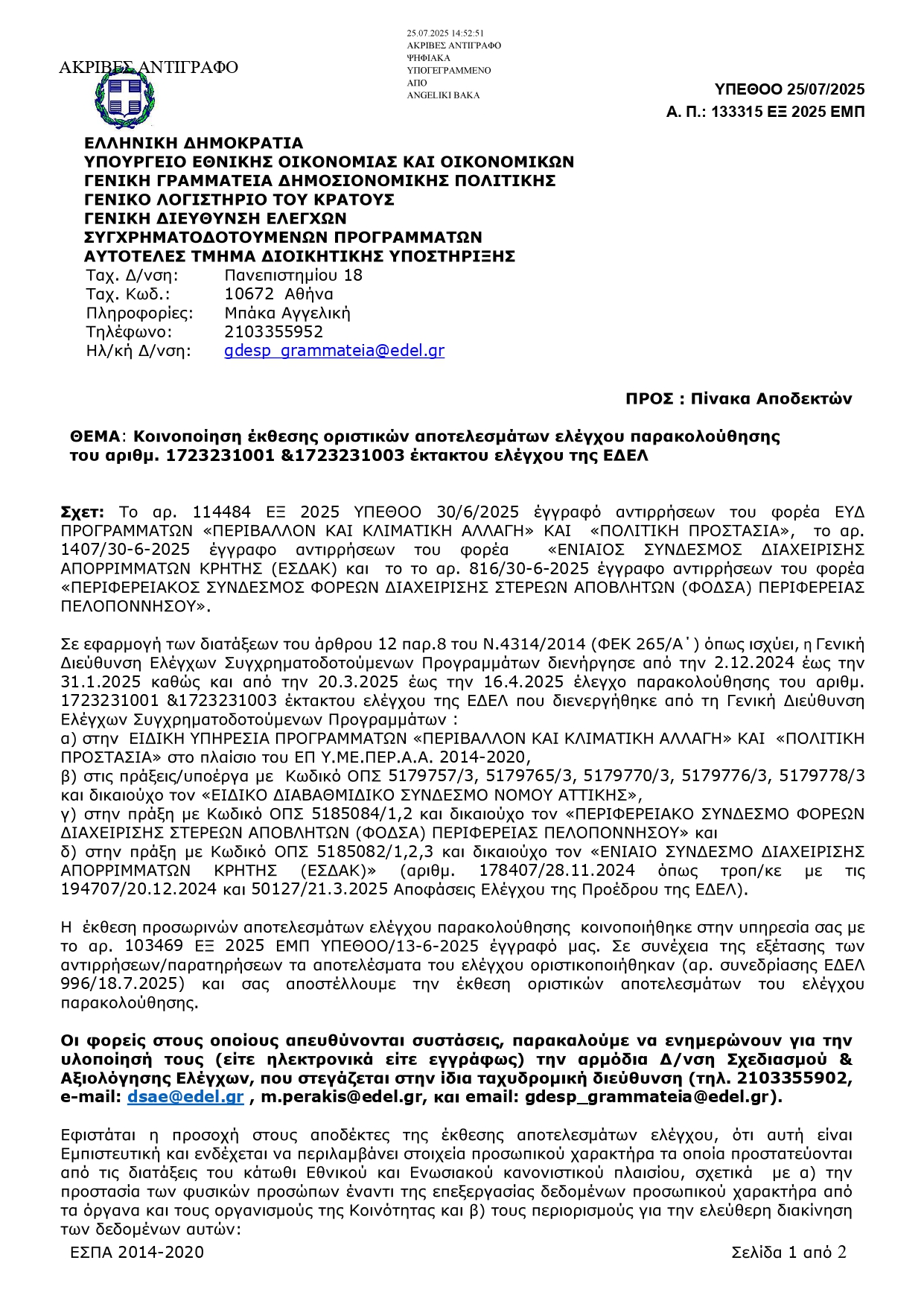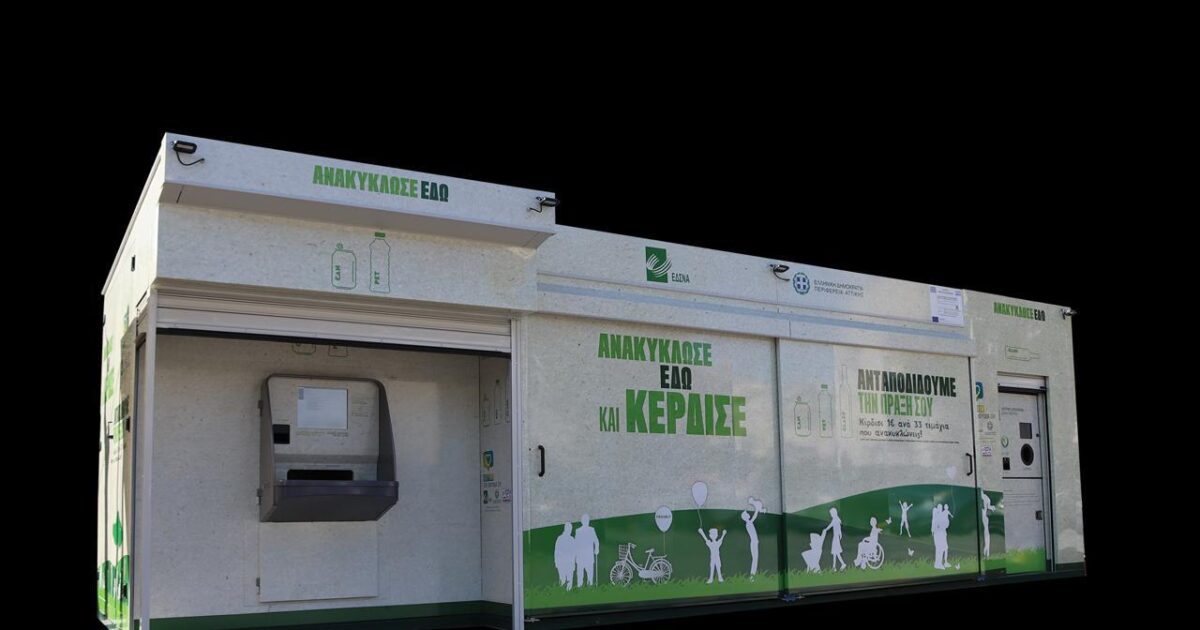In the previous programming period of the NSRF, there were Solid Waste Management Bodies – FODSA, which are responsible for managing waste in each region, who have exploited Community resources to obtain recycling equipment used by citizens.
The first FODSA to use these resources was the Attica – EDSNA Single Link, which chose 10 different recycling technologies and carried out ten supplies for the following technologies: GROUP A ‘Central Digital Platform Supply Recycling angles management and surface and underground bins “, GROUP B” Supply of Surface Recycling Angles of 6, 8 and 10 currents with built -in recognition – weighing – recording console ” Power with built -in recognition – weighing – recording console “, GROUP D” Supply and Installation of Underground Storage Systems with Lifting System for Creating Recycling Angles “, Group E” Supply and Installation Composters “, GROUP G” Supply of Bins for the Extension of Source Source of Formal Paper “, GROUP THE” Kiosks Recycling “, GROUP I” Smart Island of Recycled Recyclable Materials and Bio -Invasions ” 90.119,000 euros now VAT.
For these ten technologies, a corresponding ten international open electronic competitions were carried out through the National Electronic Public Procurement System (ESIA) and subsequently the relevant contracts were approved for signing by the Court of Auditors.
From these ten recycling technologies, according to the evidence posted on the EDSNA website (source: https://edsna.gr/statistika and https://help.edsna.gr/projects), both in the year 2023 and 2024, collected, Recycling polycendra (Group E). None of the other 9 recycling technologies stated that he collected a single pound of recyclable materials.
Subsequently, Fodsa Peloponnese and the Single Crete Waste Management Association (ECHR) announced relevant international open electronic competitions through ESIE, for the supply of recycling multipurpose, which was the most successful and efficient recycling technology.
Grant Thornton’s study
The Ministry of Development and Investment, which was responsible for funding recycling projects, commissioned Grant Thornton in April 2023, the “expertise for the evaluation of the efficiency of investment in the collection of municipal recycling of waste by high recycling”.
Grant Thornton, in the context of this detailed study, concluded that recycling polycendra is the most efficient recycling method, as it has the “better cost/benefit relationship with other similar recycling technologies”. To draw this conclusion, Grant Thornton took into account and studied all the data contained in the “Report of Evaluation of the 4115 Call for Epima” entitled “Creating Green Points and Networking themselves across the country other than the South Aegean Region” (which includes proposals). According to these data, it is clear that the cost-benefit ratio of recycling is better than all other similar recycling technologies of the 4115 Call for at least 4.1% (since the average price of the up-to-date recycling costs are € 795.76 of other similar recycling technologies is 830 €/ton/year).
Grant Thornton’s specific expertise on behalf of the Ministry of Development and Investment concluded as a final conclusion that “based on all the data analyzed in the present study, the feasibility of supplying recycling can be supplemented and can be recommended to use both other resources and other resources. Recycling with recycling equipment. “
The role of specific European Union executives in the field of recycling in Greece
There has been a great deal of discussion in various corridors about the exact role played by two specific European Union executives for recycling projects in Greece funded through the NSRF. These two executives have caused special questions why they did not deal with the nine recycling technologies funded by the NSRF and placed by EDSNA but have not collected a single ton of recyclable materials, such as, beyond any doubt, is stated on the official website. On the contrary, they have shown an exclusive preference for recycling, which is evidenced by both numbers and a simple visit to their operating points, that they are the most efficient recycling method.
Edel’s initial finding in March 2023
In recent days, suddenly, publications have been began to be distributed that again remember the initial finding of the Committee on Financial Audit of the Ministry of National Economy and Finance, which was held for the European Commission account for the above three FODS for the recycling, which has been recycled in the European Commission. 35547EX2024EB and has been known for almost 1.5 years.
In the corridors of Eden it is strongly heard that the two specific European Commission executives were calling and were particularly burdensome demanding that EDEL’s original findings be written in the original reports that could not be substantiated by the audit, while demanding that they be silenced by documents that proved that all were proven.
Tomra’s financial offer for recycling polycendra
One of the documents of documents that were essentially requested to be silenced and underestimated in the finding is the written financial offer submitted by the second participating company to these international public competitions, the Norwegian company Tomra Systems Asa, to Fodsa Peloponnese, which we reveal today.

The financial offer of the Norwegian company Tomra SYSTEMS ASA to Fodsa Peloponnese
According to the signed and deposited financial offer of the Norwegian company Tomra Systems ASA, the unit price offered is € 267,800 now 24% VAT (ie 332,072 euros) per recycling, that is, it is of the same class with the financial supply of the contractor. Of course, Tomra Systems ASA was excluded from the international public public open electronic competitions in Greece due to problems with the guarantee of participation.
As a result with the substantial silence of the document document, EDEL’s original finding was reference to the value of a recycling corner with a completely different and extremely inferior technical features to write that there are cheaper options. Obviously, any audit service should compare like similar products. Otherwise if we compare apples with oranges, we will draw unreliable conclusions.
Edel’s new updated and final finding today revealed
The new updated and final finding of EDEL, which was carried out at a new demand for the European Union, probably because important information had been provided before the Commission’s competent control mechanisms on the matter and the initial involvement of its two specific executives. It is emphasized that it is not common practice to order the Commission’s Audit Authorities for a new confirmation of EDEL findings.
The newer finding of EDEL which was notified by No. 133315EX2025EB/25.7.2025 documents fully restore the class and truth regarding the conclusions related to the recycling equipment and the supply procedure followed by FODS.


The notification letter of EDEL’s new final finding
As confirmed by the relevant FODSA documents on this final finding of EDEL:
“A. It is very important that in the newest updated finding of EDEL the original finding 2 of 6 of 6.3.3024 initial exposure of the final results of an emergency control of No. 1723231001 & 172323103 Emergency Audit of EDEL (hereinafter referred to in the original Audit Report) related to the subject “Non -Distribution by the Authorization Estimated value (PC) of the contract. Inadequate documentation by the contracting authorities FODSA P. Peloponnese and ESDAK, as well as the ESA of the EMMEPA of the reasonable value of the estimated value of each of the two corresponding contracts. “No longer exists as a finding. The relevant case -law of the WEU is advised. “
“B. It is very important that in the newest updated finding of EDEL the original finding 3 of 6.3.3024 initial exposure of the final results of an extraordinary audit No. 1723231001 & 172323103 Emergency Control of EDEL (hereinafter original control report) related to the subject “Determining the Technical Specifications. And no obstacles in the development of healthy competition “no longer exists as a finding, while simply referring to three new control criteria, which the control team of the newer up -to -date EDEL finding (hereinafter referred to as” OE “) recognizes that” they are not considered essential “. The relevant case -law of the WEU is advised. “
